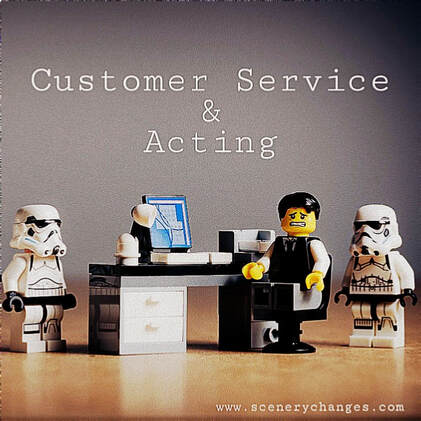|
I recently had a conversation with a fellow performer about how customer service skills can benefit an actor. The two may seem disjointed at first, but I propose that they are more similar than you think. In customer service you are seeking to provide your client with an excellent experience, and as a performer you try to do the same thing.
Working in various customer service positions over the years, I developed the mantra, “let’s find out together.” If a client asked a question that I did not know the answer to, it presented an opportunity for us both to learn. I also employed the substitution method, where I would propose an alternative if I did not have the item they were seeking. For example, if a customer wanted a cat key chain, but we did not have any, I would show them our cat bookmarks, stationary, or jewelry instead. You may be thinking, “well, that worked great on a sales floor, but what does it have to do with acting?” I’m glad you asked. In venue-specific performances, you will often get asked questions you do not know the answer to, like “where are the bathrooms?” or “where is this certain vendor?” Instead of simply brushing the patron off, you can recognize that you are part of the world of the play, and you can help them find the answer. This is a bonus because you will end up learning the correct response when you are undoubtedly asked again. In street character acting, we call the substitution method flipping the situation. The goal is to take a subpar or negative experience and turn it into a positive one. An example of when I got to employ both the substitution method and the willingness to help find a solution was when I was performing at the Kansas City Renaissance Festival. A family approached me with a few young girls who were very excited to see the mermaids but were unsure of where to find them. Now I could have said, “I’m a stage act, directing you around the fair isn’t my job,” but that would have been poor customer service and would have undoubtedly left a negative impression on the patron. Whether you call them patrons, clients, audiences, or customers, they are one and the same. They are money-paying individuals who have chosen to invest in you, and in return you should do your best to provide a quality experience for them. Now you cannot make everyone happy, that is a fact. Still, as a general rule, if you approach a situation or role with an attitude of willingness to provide excellent service, you will get a lot farther in the acting business and in your own performance than without it. Back to my example. Instead of turning the family away, I remained in character and said, “Mermaids! How exciting! Let’s find them together.” I then found out where the mermaids were and escorted the young family to the location. Sadly, when we reached the cove, the performers had already left for the day. I saw the little girls’ faces fall in disappointment. Opportunity number 2 to go above and beyond. It was time to make a substitution and flip the situation. I expressed empathy that we had just missed the mermaids and used my character’s motivation to tell stories, to create a new and happy memory. I smiled and said, “I know, why don’t we tell a story about mermaids together and I shall give you a piece of that story to take home so you can remember it and all the fun you had today forever.” After telling a tall tale of mermaids and aliens and fuzzy blankets and many laughs and smiles and small tokens I had made later, the family left with a good memory, excellent customer service, and if I say so myself, one heck of an acting performance. |
Details
Categories
All
Archives
June 2023
|



 RSS Feed
RSS Feed